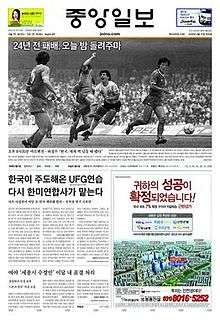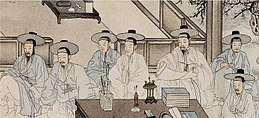JoongAng Ilbo
JoongAng Ilbo (English: The Central Times) is a South Korean daily newspaper published in Seoul, South Korea. It is one of the three biggest newspapers in South Korea. The paper also publishes an English edition, Korea JoongAng Daily, in alliance with the International New York Times.[4]
 | |
 | |
| Type | Daily newspaper |
|---|---|
| Format | Berliner |
| Owner(s) | Samsung (1965-1999) JoongAng Holdings (1999-present) |
| Founder(s) | Lee Byung-chul |
| Publisher | Kim Kyojoon |
| Founded | 22 September 1965 |
| Political alignment | Centre-right[1] to right-wing[2] |
| Headquarters | Sunhwa-dong, Jung-gu, Seoul, South Korea |
| Circulation | 1,292,498 (as of 2012)[3] |
| Website | joongang |
| Korean name | |
| Hangul | 중앙일보 |
|---|---|
| Revised Romanization | Jungangilbo |
| McCune–Reischauer | Chungang-ilbo |
 |
| Part of a series on the |
| Culture of Korea |
|---|
| History |
|
Festivals |
|
|
Music and performing arts |
|
Media
|
|
|
Monuments
|
|
National symbols of Korea
|
History
It was first published on 22 September 1965 by Lee Byung-chul, the founder of Samsung Group which once owned the Tongyang Broadcasting Company (TBC). In 1980, JoongAng Ilbo gave up TBC and TBC merged with KBS. JoongAng Ilbo is the pioneer in South Korea for the use of horizontal copy layout, topical sections, and specialist reporters with investigative reporting teams. Since 15 April 1995, JoongAng Ilbo has been laid out horizontally and also became a morning newspaper from then on. In 1999, JoongAng Ilbo was separated from Samsung.[5] As of 18 March 2007, it has produced a Sunday edition called JoongAng Sunday.
English and international issues
The Korea JoongAng Daily is the English language version of the newspaper, and it is one of three English-language daily newspapers in South Korea, along with The Korea Times and The Korea Herald. It runs mainly news and feature stories by staff reporters, and some stories translated from the Korean language newspaper. The Korea JoongAng Daily is currently sold together with the International New York Times.
JoongAng Ilbo also publishes a United States edition, with branches from Toronto to Buenos Aires. Its parent company, Joongang Media Network (JMNet) holds publication rights to Korean editions of Newsweek and Forbes as well as 25% of the shares of JTBC cable TV.
Criticism
See also
- List of newspapers in South Korea
- Communications in South Korea
- List of Korea-related topics
- Joongang Tongyang Broadcasting Company
- Sohn Suk-hee
References
- "Who's Right About the New US-South Korea Joint Military Exercise?". The Diplomat. 8 March 2019.
The editorial boards of the center-right JoongAng Ilbo and right-leaning Chosun Ilbo newspapers were in staunch opposition.
- "The contradictions of Dresden". NK News. 25 April 2014.
The state-funded news agency, Yonhap, called it a “landmark speech” and the right-wing JoongAng Ilbo decided that she had “made history.”
- "Korea Audit Bureau of Circulations".
- "Archived copy". Archived from the original on 2013-10-15. Retrieved 2013-10-15.CS1 maint: archived copy as title (link)
- Kim, Chunhyo (2016-02-26). "Samsung, Media Empire and Family". doi:10.4324/9781315669045. Cite journal requires
|journal=(help)
External links
- Official website (in Korean)
- Korea JoongAng Daily (English-language version of the newspaper)
- Joins.com (web portal of the JoongAng Media Network Group)